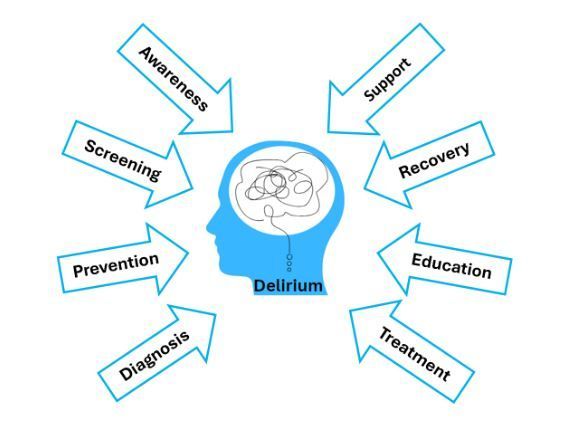Delirium Research Priorities
Help us Decide the Future of Delirium Research
Delirium is serious and distressing condition, but there is limited research on delirium care. We need your help to decide what questions should be answered by research to improve the care we provide for people with delirium.
This project is a partnership between patients, carers, and clinicians, who are working together to identify the questions about delirium that are most important for research to answer. This research is facilitated by
James Lind Alliance (JLA).

Delirium is:
- a sudden change to a person’s mental state that can be related to the effects of illness, injury, having surgery, medicines, or withdrawal from drugs or alcohol.
- a medical condition, which is often not recognised and needs urgent medical care.
- a temporary condition that develops quickly over hours or days but can last a few days or weeks.
- different from dementia which occurs more gradually and for a longer time, but both can happen at the same time.
- more common in older people and people living with dementia but can affect anyone.
People with delirium can find it hard to:
- deal with the symptoms, such as seeing or hearing things that are not there.
- trust the people caring for them.
- manage emotions.
- communicate their needs.
- make decisions.
- care for themselves.
Delirium can be frightening. It can lead to slower recovery from illness, and longer hospital stays.
Why is this study important?
By understanding what people think are the most important topics to address for delirium research, we can focus our efforts on producing meaningful improvements.
Who should take part in this study?
- People who have had delirium.
- People who have cared for someone with delirium, e.g. family members
- People with health conditions that increase the risk of delirium (e.g. people living with frailty or dementia, cancer), and their carers or family members.
You must live in Australia or New Zealand and be aged 18 years or older to take part in this questionnaire.
How can I take part in the study?
If you would like to take part in the study, please complete our survey. The survey should take 5-10 minutes to complete. It is up to you how much information you provide. By submitting your responses, you consent to participate.
If you would like to be involved in the next stage of the study or if you would like to hear the results of the study, you will be asked to provide some contact details at the end of the survey. We will separate your contact details from your responses and only use them for future contact about the study. Your information will be kept safe on a password-protected drive that only the project team can use, and we will be delete them once the study is complete.
Who is supporting this study?
This study has been approved by Metro North Hospital and Health Service and the University of Technology Sydney. This survey is being carried out in collaboration with the James Lind Alliance, a UK-based, non-profit initiative, which works with partners to facilitate the setting of health research priorities.
This study has been approved by the Metro North Health HREC (EC00172), HREC reference number HREC/2024/MNHA/110598. For more information about your rights as a participant, or should you wish to make an independent complaint, you may contact the Coordinator or Chairperson, Human Research Ethics Committee, Royal Brisbane & Women’s Hospital, Herston, Qld, 4029 or telephone (07) 3646 5280, email: MetroNorthResearch-Ethics@health.qld.gov.au.You may also contact the Metro North Health Research Governance Manager by telephone: 07 36479550 or email: MetroNorthResearch-RGO@health.qld.gov.au
Who can I contact for more information?
If you need more information or if you would like a paper survey, please contact:
Liliana Botero
Project Coordinator,
Royal Brisbane and Women's Hospital
liliana.boterozapata@health.qld.gov.au
Professor Alison Mudge
Project Lead,
Royal Brisbane and Women's Hospital
Alison.Mudge@health.qld.gov.au
